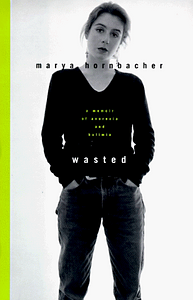You need to sign in or sign up before continuing.
Take a photo of a barcode or cover
dark
emotional
reflective
sad
tense
fast-paced
Graphic: Addiction, Body shaming, Eating disorder, Fatphobia, Mental illness, Self harm, Suicidal thoughts, Forced institutionalization, Vomit, Dysphoria
This memoir of a young woman's struggle with eating disorders is absorbing, disturbing, and really well-written. I think it's pretty clear that the author wasn't really "recovered" yet when she wrote this, but maybe EDs are one of those shackles that are often never truly shaken off. I am someone with more garden-variety food issues (and not any real self-destructive tendencies) but even so I found her accounts of the motivations and feelings behind her behavior compelling and understandable. There were numerous instances of me thinking, "Yes, I have felt EXACTLY like that." Of course, then there was plenty of me thinking, "Holy cow, this girl is RAVING MAD." Part of me is ashamed to admit the voyeuristic appeal of smart-but-crazy-chick books like this or Prozac Nation but this one is certainly a top-notch, thoughtful example of the genre.
dark
emotional
hopeful
slow-paced
Tumultous, vivid, sort of babbling writing that spills over itself, veers into second person, and ultimately conveys the fact that the author was only 22 when she wrote this. It's hard to put this down because it's manic in its frenzy to describe what it was like to develop an eating disorder and eventually become completely unhinged because of it.
Marya has a problematic family dynamic. She grows up too fast, becomes a bad girl when she's really, really young: "...my first-day-of-school photo from sixth grade shows me standing in a knee-length blue skirt and a plaid shirt, bobby socks and tennis shoes, ponytail, ribbon, smiling for the infernal camera. One year later, I am leaning against the house, my hair down, wearing a long black skirt and a tank top, unsmiling, face thinner, lipstick, morning light. I am twelve years old. I look about twenty-two." (p. 57) But she's so driven to grow up that she gains all this freedom, goes to boarding school, lives in California. This freedom is very isolating and lets her grow her eating disorder for years, in secret, until it's out of control. She describes hospitalizations and sickening health problems.
At the end, it becomes a wonder that she can function. She never really is cured, more like she stops the behavior and then writes a book. The book is full of insights but I never got the feeling that after recovery she enjoyed having a body and eating.
Marya has a problematic family dynamic. She grows up too fast, becomes a bad girl when she's really, really young: "...my first-day-of-school photo from sixth grade shows me standing in a knee-length blue skirt and a plaid shirt, bobby socks and tennis shoes, ponytail, ribbon, smiling for the infernal camera. One year later, I am leaning against the house, my hair down, wearing a long black skirt and a tank top, unsmiling, face thinner, lipstick, morning light. I am twelve years old. I look about twenty-two." (p. 57) But she's so driven to grow up that she gains all this freedom, goes to boarding school, lives in California. This freedom is very isolating and lets her grow her eating disorder for years, in secret, until it's out of control. She describes hospitalizations and sickening health problems.
At the end, it becomes a wonder that she can function. She never really is cured, more like she stops the behavior and then writes a book. The book is full of insights but I never got the feeling that after recovery she enjoyed having a body and eating.
Very few books have touched my life more than this one. It’s triggering, yes, but because it’s very, very real. There is no sugar coating. Marya lays it all out there for you, she tells you straight up what she did or did not do, she makes no excuses for the bad, she does not gloat about the good. A very raw memoir. I would say this is a must read for anyone dealing with a loved one struggling with an eating disorder but it’s worth noting that even for someone who isn’t personally affected, this can be a tough read if you’re not in the right mindset. Personally, I love it, and I re-read it every couple of years.
It's been several years since I actually read this, but since I am beginning Hornbacher's recent book, I thought I would add this one. Despite the years, this book has stuck with me. Hornbacher wrote a very honest, horrifying auto-biography about living in the depths of an eating disorder. Because it is so honest, it might be advised that someone with an ED not read it because of the methods she uses. I would definitely recommend it for anyone trying to understand someone with an ED, though.
challenging
emotional
sad
medium-paced
Book Riot Read Harder 2019:
#5 A book by a journalist or about journalism
Popsugar Reading Challenge 2019:
#40 Your favorite prompt from a past Popsugar Reading Challenge (2017 - on my TBR list for way too long)
#5 A book by a journalist or about journalism
Popsugar Reading Challenge 2019:
#40 Your favorite prompt from a past Popsugar Reading Challenge (2017 - on my TBR list for way too long)
holy fuck.
marya hornbacher wrote this book when she was twenty-three, a mere three or four years after the last of the events it describes. every time i remember that, i’m staggered. because everything about this book, from the cutting and evocative prose, to the expert control of the flow of the narrative and the moments on which the camera lingers or skims over, to the starkly honest and no-bullshit voice with which hornbacher describes the horrific experiences she had at the hands of her disorder, speaks to a jawdroppingly refined skill and a remarkably clear-eyed ability to understand herself and the world.
reviews mention hornbacher’s lack of self-pity. that wording sets my teeth on edge a little, because i think any person who has had to live with lifelong mental or physical illness has earned a little self-pity. still, i have to agree with said reviews; i think it’s less a conscious avoidance of self-pity, though, and more a conscious striving for the truest way to tell her story, as harshly-bleakly-honestly as she can. (hornbacher is a poet, too [i think], and it shows in the profound clarity with which she tells her own story and the careful crafting of each sentence itself.) i think it also has something to do with, as she says: “being sick gets singularly boring after a while.” at some point the enticing romance of destroying yourself turns into exhaustion, which turns into frustration, which, maybe, turns into recovery.
i really don't know what to say about this book. i marvel at it on a prose level; i marvel at it as a memoir. i'm reluctant to say i "recommend" it, because it's a very difficult book to read; hornbacher threw herself wholly into her illness for fourteen years, and even the recollection on paper is painful to witness. and i definitely wouldn't recommend reading it if eating disorders are a triggering topic, because the level of detail here is razor-sharp. but i'll say this: i'm in awe of it. this copy includes a follow-up afterword written in 2014, and it came very close to making me cry, and i don't often cry when reading. one of the best books i've read this year, 100%.
February 18, 1993. I am given a week to live.
Four years (approximately 169 weeks, 1,183 days, 28,392 hours) pass.
March 11, 1997. I am alive.
marya hornbacher wrote this book when she was twenty-three, a mere three or four years after the last of the events it describes. every time i remember that, i’m staggered. because everything about this book, from the cutting and evocative prose, to the expert control of the flow of the narrative and the moments on which the camera lingers or skims over, to the starkly honest and no-bullshit voice with which hornbacher describes the horrific experiences she had at the hands of her disorder, speaks to a jawdroppingly refined skill and a remarkably clear-eyed ability to understand herself and the world.
I have an eating disorder, no question about it. It and I live in an uncomfortable state of mutual antagonism. That is, to me, a far cry better than once upon a time, when it and I shared a bed, a brain, a body, when my sense of worth was entirely contingent upon my ability to starve. A strange equation, and an altogether too-common belief: One’s worth is exponentially increased with one’s incremental disappearance.
reviews mention hornbacher’s lack of self-pity. that wording sets my teeth on edge a little, because i think any person who has had to live with lifelong mental or physical illness has earned a little self-pity. still, i have to agree with said reviews; i think it’s less a conscious avoidance of self-pity, though, and more a conscious striving for the truest way to tell her story, as harshly-bleakly-honestly as she can. (hornbacher is a poet, too [i think], and it shows in the profound clarity with which she tells her own story and the careful crafting of each sentence itself.) i think it also has something to do with, as she says: “being sick gets singularly boring after a while.” at some point the enticing romance of destroying yourself turns into exhaustion, which turns into frustration, which, maybe, turns into recovery.
I know for a fact that sickness is easier. But health is more interesting.
i really don't know what to say about this book. i marvel at it on a prose level; i marvel at it as a memoir. i'm reluctant to say i "recommend" it, because it's a very difficult book to read; hornbacher threw herself wholly into her illness for fourteen years, and even the recollection on paper is painful to witness. and i definitely wouldn't recommend reading it if eating disorders are a triggering topic, because the level of detail here is razor-sharp. but i'll say this: i'm in awe of it. this copy includes a follow-up afterword written in 2014, and it came very close to making me cry, and i don't often cry when reading. one of the best books i've read this year, 100%.
It is in your nature to heal. The lines you've fed yourself and been fed about your tragic self-destructive nature are your invention. It is in your nature not to careen toward your own death, but to persist in your own life.
This is far and away one of the best books I read. It's smart and honest and not sugar-coated and it gives you so much information on the author's struggle with not just eating disorders but other problems that stemmed from her need of control and cycle of self-abuse (self-mutilation, drug abuse, etc). You learn a lot clinically as well as emotionally. It's told very matter-of-fact and not as a victim. I think it's as much an exercise for the author to work through what happened as it is her sharing her story with the reader.
I highly recommend it to whomever is interested. I read it when I was 15 and so did most of my friends, but I know I gave it to my mom to read and she had some of her friends read it to.
I highly recommend it to whomever is interested. I read it when I was 15 and so did most of my friends, but I know I gave it to my mom to read and she had some of her friends read it to.








